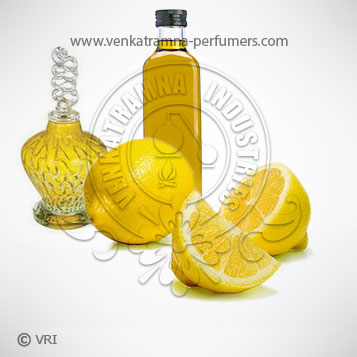
| Botanical Name | Citrus limonum |
| Common Name | Yellow Fruit |
| Country of Origin | India, Burma, China |
| Solubility | Insoluble in water, soluble in alcohol and oils |
| Specific Gravity | 0.8603 @ 72°F |
| Optical Rotation | 50.5 |
| Refrective Index | 1.4748 @ 72°F |
| PlantPart | Fruit Peel |
| Bland With | It can mix well with lavender, rose, sandalwood, benzoin, eucalyptus, geranium, fennel, juniper, neroli and elemi. |
| CAS No | 68917-71-5 |
| Flash Point | 75 °C |
| Extraction Method | steam distillation |
Lemon is a small evergreen tree originated in Asia. The lemon fruit is widely used for culinary and non-culinary purposes across the world. Lemon juice has about 5% citric acid that gives lemon a sour taste. Owing to the sour flavor, it is used in many lemon-flavored drinks and candies. The origin of the lemon is unknown, though lemons are thought to have first grown in Assam (a region in northeast India), northern Burma or China. A study of the genetic origin of the lemon reported it to be hybrid between bitter orange (sour orange) and citron. Lemons entered Europe near southern Italy no later than the second century AD, during the time of Ancient Rome. However, they were not widely cultivated. They were later introduced to Persia and then to Iraq and Egypt around 700 AD. The lemon was first recorded in literature in a 10th-century Arabic treatise on farming, and was also used as an ornamental plant in early Islamic gardens. It was distributed widely throughout the Arab world and the Mediterranean region between 1000 and 1150. Lemons are ready to pick as soon as they are yellow or yellow green in appearance and firm. The fruit will be 2 to 3 inches in size. It’s better to wait until they are the right size and not worry so much about color than to wait for them to be completely yellow.
If sunshine could be captured in a fruit it would be a lemon. The zesty aroma just bursts with vibrancy, tickling the soul like a beam of sunlight. The scent of Lemon oil instantly reminds us of sunny climes and spreads a little bit of Mediterranean ambiance. It is difficult to determine the exact origin of Lemon, so widespread has been his wanderings. It is believed to have originated in India or Southeast Asia, spreading at first to China, where it was cultivated for about 4000 years. From there it found its way to the Arab world, and eventually, to the Roman Empire. Northern Europeans probably first encountered them by the returning Crusaders. By the Middle Ages, Lemons were well known even in England. Yet, their true value as a life-saving anti-scorbutic remedy was not realized until the age of the great sea voyages, when it was discovered that sailors who had access to lemons did not fall prey to scurvy. Thus, it became a standard provision to carry Lemons on every long-term sea journey, which is why British sailors became known as 'limeys'. During the renaissance, the attractive citrus trees with their sweet-scented flowers became very popular with the aristocracy and it became fashionable to grow them far beyond their natural range. Special conservatories had to be built just to shelter the sensitive trees from the harsh northern European winters. Columbus introduced Lemons to the New World; he took some seeds and planted them in Hispaniola - which may well have been his best deed. Some scholars believe that Lemons might have been the 'Golden Apples of the Hesperides'. Others favour peaches - the final verdict on this question is still to be decided. Lemons, along with Myrtle, Willow and Palm, play a role in the Jewish festivities of the Tabernacle. In Jewish tradition Lemons symbolize the heart.
Color : Pale yellow liquid @22C with Fruity, citrus odor,
Aroma : Strong citrus scent.
It contains the Vitamin C - 45 mg, Calcium - 22 mg, Potassium - 116 mg, Carbohydrates - 7.8 g, Protein - 0.9 g, Fat - 0.25 g, Calories - 100
Due to its sour taste, the juice finds usage in various drinks, for garnishing, citric acid and also in lemon battery. Lemon essential oils act as natural antiseptic, it can be used to clean minor wounds to prevent infection. It is traditionally used in Ayurveda to treat superficial cuts, scrapes and burns to speed up the healing process. It is full of antioxidants and vitamin C. These properties of lemon oil fight off acne-causing germs.